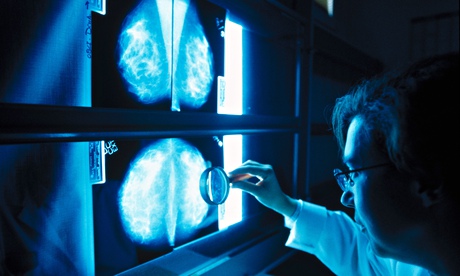
It is uncomfortable and not always conclusive. About one in 20 women are called back for further tests, of whom one in six will have breast cancer: but it is not always clear if this breast cancer would have killed you. Turning down any screening feels ungrateful – but perhaps less so now. Research in the BMJ last week showed that breast cancer screening was nearly as unreliable as screening for prostate cancer, and should probably not be offered routinely to women over 50.
The paper covered a 25-year study in Canada, in which 89,835 women between the ages of 40 and 59 were randomly assigned to have five annual screening mammograms or taught to self-examine for breast cancer. A total of 3,250 women in the mammography group and 3,133 in the self-examination arm developed breast cancer, and 500 in the screening group died compared with 505 in the latter group. So there was no real difference. The researchers showed that mammography overdiagnosed by 22% by finding tumours that over this 25-year period did not develop into cancers causing symptoms or death. A previous study from Malmo put overdiagnosis of clinically insignificant breast cancers at 10%. In the UK, women are invited for mammograms every three years if they are between 50 and 70 years of age.
There has been growing controversy as to how useful screening is for some time. A recent report from the Swiss Medical Board said that regular screening saved one or two women out of 1,000, but found inaccurate results in 100 out of 1,000 women, causing psychological stress and unnecessary treatment. It recommended that no new breast-screening programmes be set up and that existing ones were given a time limit.
So is this enough to put you off, or do you think the benefit of finding an earlier cancer (which is usually thought to offer a better chance of normal life expectancy) merits a mammogram?
The solution
To have a mammogram or not is a personal decision, and it is now reasonable to question whether you should. Experts have argued over this latest study, with a Harvard radiologist questioning the quality of equipment in the study and whether women who were suspected of having breast cancer were allocated to the mammogram group. Both would have skewed results, he says.
In an editorial accompanying the research paper, Mette Kalager from the University of Oslo argues that deaths from breast cancer are falling due to better treatments such as Tamoxifen, rather than because of earlier diagnosis by screening. A review in the journal Cancers is worth reading because it runs through key research studies and their critiques.
So it is fine to be unsure as to what to do: research is showing that it should be a decision, and not just a given.
• Dr Luisa Dillner is head of research and development at BMJ.

